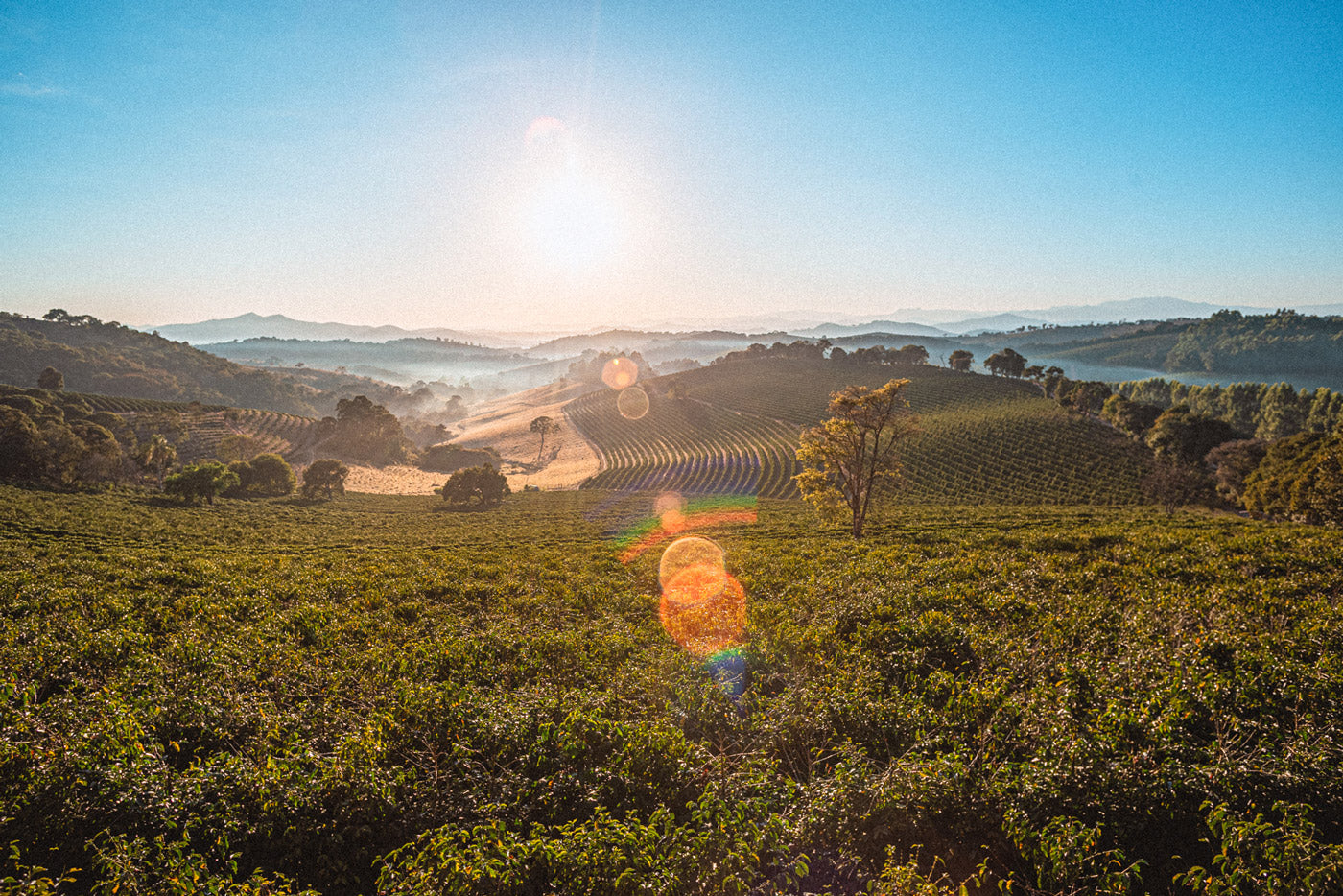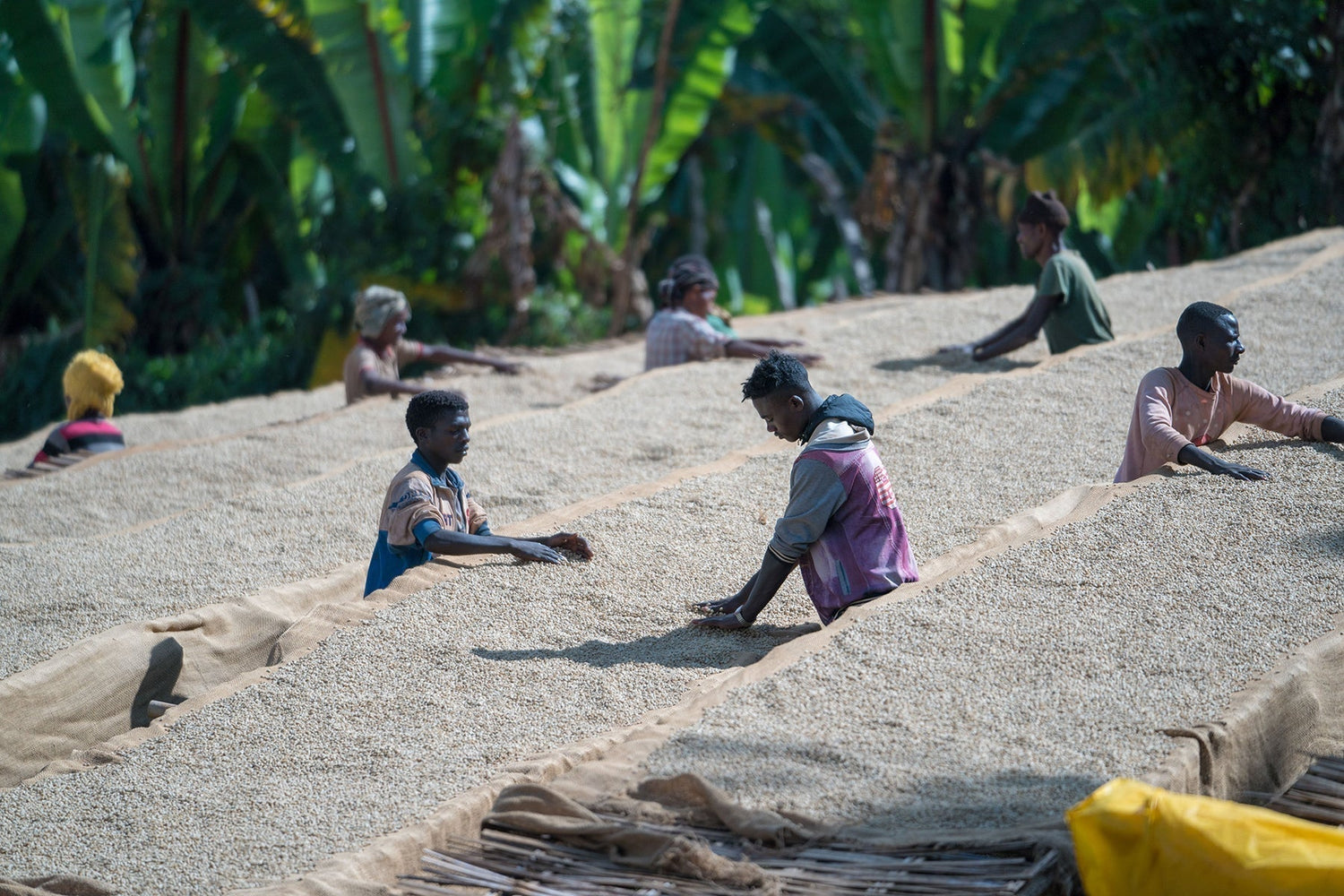Sustainable coffee... is that even possible? By now, almost everyone should know that coffee cannot be grown everywhere . In this blog article, we want to show you what farmers and roasters can do to produce sustainable coffee.
When it comes to sustainable coffee, there are a few things to consider when buying. Elias Fischbacher from the Wildkaffee Rösterei wishes you lots of fun discovering.
Sustainable coffee - what does that mean?
When you look at the coffee growing areas, the first question arises. What is the composition of sustainable coffee? Of course, coffee cannot be truly sustainable, because coffee production and the individual stages that are passed through during processing are not exactly resource-saving . Transporting coffee from countries of origin to Europe, or rather to the whole world, consumes a lot of energy. Logically, it is not possible to change this, because these climatic conditions from the countries of origin are needed to be able to grow coffee at all.
There is no such thing as truly sustainable coffee, but there are a few things you can consider to ensure that more or less sustainable coffee ends up in your cup. In the following points, we will explain some of these aspects to you using our coffees as examples.

Sustainable coffee - respectful treatment of soils and nature
As our first point, we have chosen one of the most important. It is the respectful treatment of the soil and nature, which is immensely important for sustainable coffee. If coffee is grown as cheaply as possible, toxic fertilizers and pesticides are used to combat pest infestation. These toxins are killed during the roasting process, but they harm nature, the soil and the employees!
Fairtrade seals are a small support that the end consumer can rely on, but they are absolutely not a must. These seals are very expensive for the farmers and the certification, which is associated with considerable costs, has to be done again every year . Smaller farms simply cannot afford this, even though they produce according to organic standards. Organic seals are therefore a support for the buyer, but there are also significantly higher quality coffees that do not have a seal.
We at the Wild Coffee Roastery rely on our long-standing relationships directly with the farmers. By regularly traveling directly to the plantations, we can guarantee that work is carried out in harmony with nature and that no harmful pesticides are used.
Sustainable coffee - the working conditions
When talking about sustainable coffee, the working conditions on the plantations should of course also be mentioned. Here, too, there are seals that are intended to guarantee fair pay for farmers and their employees. The best known is probably the Fairtrade seal. Like the organic seal, this seal also requires a costly certification process . Smaller farms cannot always afford this seal and this certification process must also be carried out annually. This poses a great risk for farmers, especially in emerging countries. Such certification is basically only possible for established cooperatives .
We also rely on trips to the farmers when it comes to working conditions, which should make up a large proportion of sustainable coffee. This allows us to examine the working methods and address any grievances directly.

Sustainable coffee - the price!
Sustainable coffee and the global economy could not be more contradictory. The low world market price of coffee is a huge problem . The current price per kilo (June 2022) is currently €4.80 per kilogram of coffee . This world market price is being aggressively pushed down by the large corporations. The prices also have a direct impact on the circumstances and conditions that prevail on the farms. The less is paid, the more the conditions suffer.
Sustainable coffee depends on organic farming and fair treatment of farmers and workers. A cheap coffee price ends in the exploitation of farmers and workers . Not only are they exposed to starvation wages, but the working conditions also suffer massively. Toxic pesticides are used that cause great harm to people and nature, which is why it is so important to look at the price of coffee.

Sustainable coffee - where does the responsibility lie?
In order to be able to offer coffee that is as sustainable as possible, the responsibility lies with the roasters and traders . Why with the roasters? Because the roasters can decide where they get their coffee from and which trading structure they use. If sustainable coffee is to be processed, it is advisable to use direct trade . Good relationships with the farmers pay off. Roasters can inspect the sustainable coffee and get a picture of the conditions on the plantations for themselves. Direct trade not only improves quality, but also working conditions. The farmers are paid fairly for their work and can therefore invest in their infrastructure and processes . Both sides develop a greater understanding of each other's position. Not only can quality and processes be optimized, but the costs of production and export also become more understandable. Closer trading relationships make many buyers more aware that by charging reasonable, higher prices they are not only investing in sustainable coffee, but also in the quality of life of the farmers and their families.
The processes in the roastery should also be considered in relation to sustainable coffee. This starts with the packaging, the coffee bag and the machines that are used. For example, our bags are made of recycled plastic and in everyday life at the roastery we also try to throw away as little as possible. Every cardboard box, every filling material and the remains of coffee roasting find a use in our company. The skins are taken to the organic waste recycling plant in Garmisch-Partenkirchen , from which biogas and energy are generated.
Sustainable coffee - The term explained
Let's go back to the term sustainable coffee. Sustainable coffee is made up of many more aspects than just ecological production. Sustainable coffee encompasses a number of points. It should be fairly traded, socially acceptable - in other words, no exploitation and a certain level of security, high-quality coffee - no mass production - quality and taste are the main focus, advanced production - especially with regard to sustainability, care should be taken to ensure that as little energy and resources as possible are used for cultivation . If all of these aspects are taken into account, the coffee may not be 100% sustainable, but it will definitely be more sustainable and that should be the goal!

Sustainable coffee - conclusion!
Let's summarize everything again briefly. Is 100% sustainable coffee possible? Unfortunately not. Since the coffee has to take a long journey to your cup and many resources have to be used in the process, coffee cannot be completely sustainable. However, some aspects such as excellent quality, fair trade, advanced production - both on the plantation and in the roastery. All of these aspects help the farmers to lead a life with a better quality of life and we are rewarded with exquisite coffees of the highest quality. We at the Wildkaffee Rösterei have been relying on direct trade from the very beginning and have optimized our processes in the roastery and the raw materials we use. Our goal is to only offer you selected coffee that is as sustainable as possible and that always complies with our social, fair principles. This way you can enjoy your cup of coffee without a guilty conscience . In our online shop you can 100% trace where your coffee comes from. Discover now!


